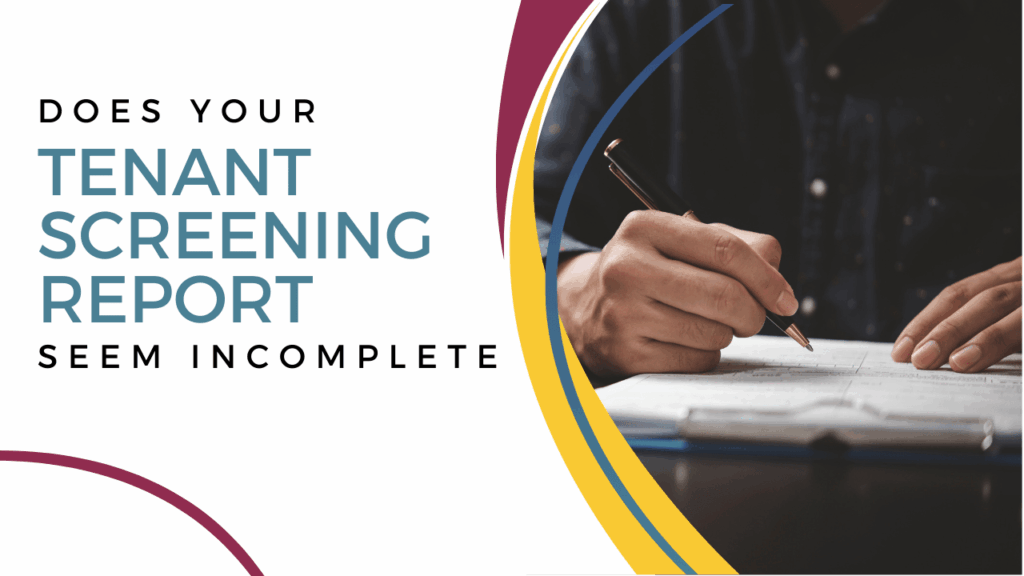
How confident are you in your screening process?
When you’re looking to place a good tenant in your Las Vegas rental property, tenant screening is one of the most critical steps in filling your vacancy and protecting your rental investment. This is important across property and management types. Whether you’re renting out a single-family home or a portfolio of multifamily properties, the people who live in your units directly impact your income, property condition, and peace of mind.
If you’re not working with a professional Las Vegas property management partner, it’s possible your tenant screening report is incomplete.
You need a comprehensive screening report that ensures you have all the information you need about the person or people who want to rent your home.
What happens when the report you’re relying on gives only a partial picture of an applicant? How can you make up for the information it lacks without violating fair housing laws?
Many landlords assume that a standard background check or credit pull is enough. Unfortunately, incomplete screening can result in missed red flags, unpaid rent, costly evictions, and even damage to your property’s reputation.
If you’ve ever wondered whether your tenant screening process is thorough enough, we are here to help you decide whether you’re doing an adequate job of screening or whether there’s room for improvement.
Here, we’re breaking down the essential components of a complete tenant screening report to identify what might be missing from yours.
What Makes a Screening Report Incomplete?
Tenant screening is a multi-layered process. While many reports provide surface-level data, a truly complete profile digs deeper. Here are some of the most common gaps in incomplete screening reports:
- Lack of Nationwide Eviction Checks
Many screening tools only pull eviction records from specific counties or states, and they are often just where the applicant has most recently lived. That’s problematic for landlords trying to make informed decisions. Considering that tenants are moving around more than ever, you need to know whether they’ve left behind a string of bad experiences in other states. An applicant may have a clean record in Nevada, but you’ll want to know if they have been evicted in California or Florida. If your screening report isn’t pulling data from a national database, you’re missing a critical piece of their rental history.
If you’re screening on your own, make sure you can access the national eviction database. If you’re working with a third party, ensure that the screening provider includes access to nationwide data. This includes filings and judgments across all 50 states. Even better, some platforms now use tech tools that can search for alternative records that may not be captured in traditional court data.
You want to make sure the information you gather is accurate. If you find an eviction that was not disclosed on the application, ask the tenant about it.
- Surface-Level Credit Analysis
A credit score is useful, but it’s only a snapshot. Incomplete screening reports often stop at the score and neglect to offer context or interpretation. Two applicants may have similar scores but drastically different financial behaviors. For example, one might have a stable history of on-time payments and manageable debt, while the other may be drowning in revolving credit card debt and barely scraping by. Just because someone’s credit score is decent doesn’t mean they’ll prioritize paying rent on time every month.
A comprehensive screening report should include:
- A breakdown of credit account types such as auto loans, student loans, credit cards, and medical debt.
- Payment history trends that highlight 30/60/90-day delinquencies
- Total monthly debt obligations that will help you to assess rent-to-income ratio
- Public records like bankruptcies or liens
By digging deeper into an applicant’s credit profile, you can assess not just their score, but their overall financial responsibility. A tenant with a great credit score who left their last utility bills unpaid may not be who you’re looking for.
- No Income Verification
There are so many ways to verify income these days that it’s a huge red flag if you cannot seem to get confirmation of what your applicant claims to earn. It’s common for tenants to self-report income on rental applications, but self-reported data is not always accurate. Incomplete screening reports often fail to verify whether the applicant actually earns what they claim.
If you cannot verify income, your screening report is definitely incomplete.
If a tenant overstates their income or fails to mention inconsistent earnings such as freelance or gig work, they might appear qualified when they’re not. This leads to higher risk of late payments or defaults. A complete screening process should include income verification, either through automated bank statement analysis, recent pay stubs or W-2 tax forms, or direct employer verification. Some screening tools now offer digital income verification that allows tenants to securely link their payroll provider or bank account, giving landlords fast, verifiable income data.
- Missing or Inadequate Landlord References
Many landlords skip landlord references entirely, or they settle for a name and number on an application without vetting the source. Worse, some tenants provide fake or misleading references to mask a poor rental history. This matters. A call to a previous landlord can reveal red flags that no background report can, such as late payments, noise complaints, unauthorized occupants, or poor treatment of the property. Always verify that the person you’re speaking to is the actual property owner or manager (check property records if needed). Ask detailed questions, such as:
- Did they pay rent on time?
- Would you rent to them again?
- Did they give proper notice?
- Was the property left in good condition?
Even just five minutes on the phone can provide invaluable insight. We are a big fan of gathering information on landlord references. If applicants hesitate to provide them, you might wonder why.
- No Criminal Background Checks or Limited Jurisdiction
Some screening reports only include criminal checks from a limited number of counties, leaving out other jurisdictions where your applicant may have lived. Incomplete criminal background checks can miss prior convictions or serious charges, especially if they occurred in a different state or jurisdiction. We want to make sure our background check includes nationwide criminal databases and sex offender registries. We are also looking at terrorist watch lists and alias or name variation searches.
Additionally, be aware of local and state laws about using criminal records in rental decisions, as some jurisdictions limit what landlords can consider. In Las Vegas, landlords can consider criminal history when screening tenants, but they must do so in a consistent and nondiscriminatory manner.
- Employment History Gaps
Incomplete screening may fail to examine an applicant’s employment history. Knowing where your tenant works today is important, but knowing how stable their employment has been over time can be just as critical. A history of frequent job changes may suggest financial instability. A long gap in employment could indicate past difficulties that may affect their ability to pay rent reliably.
We look for a strong screening report that provides employment history alongside income verification. Ask applicants to include previous employers, dates of employment, and job titles. Consider contacting past employers to confirm the information if something doesn’t feel right.
- Inconsistent or Incomplete Rental History
Some reports simply don’t include detailed rental history, or rely too heavily on the applicant’s memory and self-reporting. You want to be able to track their history over the last few years so you know where they’re coming from and what kind of experience they’ve had renting homes.
Rental history helps predict future behavior. Someone who has moved every six months without explanation may pose a higher risk for early lease termination or inconsistent payments.
Pull address history from credit reports and public records. Compare the results with the rental application to identify discrepancies or gaps. Look for mismatches.
Why Incomplete Screening Reports Happen
Why do screening reports often come up short?
Here are a few common reasons:
- Low-cost screening services. Some providers offer bare-bones reports to save costs but sacrifice depth.
- Landlords using outdated methods. Relying on a basic credit report or a local-only eviction search isn’t enough in today’s rental market.
- Automation without verification. While online applications make things faster, they sometimes prioritize convenience over quality.
If you’re using an “all-in-one” service that promises instant reports for low fees, you might not be getting the full story. Work with a Las Vegas property manager instead, especially when you want all the information that matters.
Las Vegas Property Managers Can Offer a More Comprehensive Screening Experience
 Partnering with a professional property manager can eliminate the guesswork and provide a higher level of due diligence. We have access to the best technology and professional-grade tools. We use screening platforms that provide nationwide eviction and criminal data, full credit reports with detailed analysis, and fraud detection features.
Partnering with a professional property manager can eliminate the guesswork and provide a higher level of due diligence. We have access to the best technology and professional-grade tools. We use screening platforms that provide nationwide eviction and criminal data, full credit reports with detailed analysis, and fraud detection features.
There’s also a thorough verification process. We don’t just take documents at face value. We verify income, employment, and rental references systematically. We’re trained to spot inconsistencies and follow anything that doesn’t look right.
You cannot afford an incomplete screening report. Let’s make sure you’re getting the best possible tenant. Please contact us at New West Property Management. Our team expertly manages residential rental homes in Las Vegas and throughout Clark County, including Henderson and North Las Vegas.
